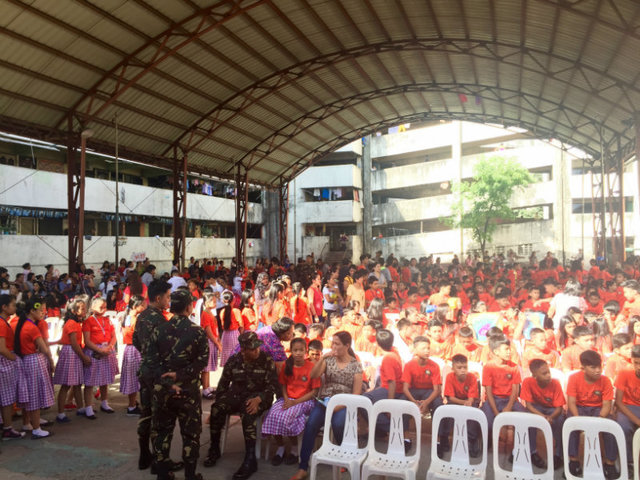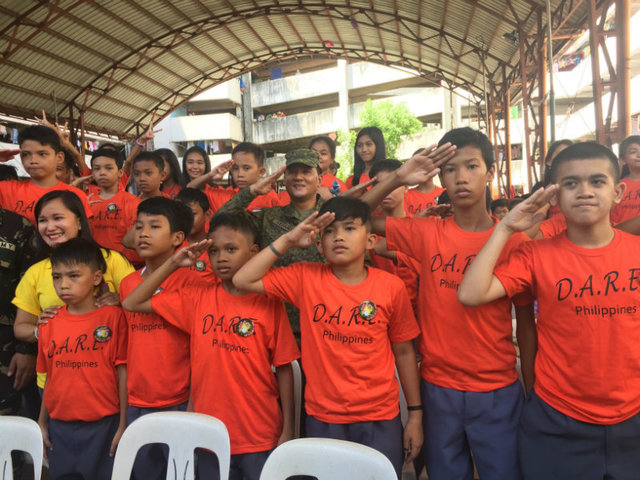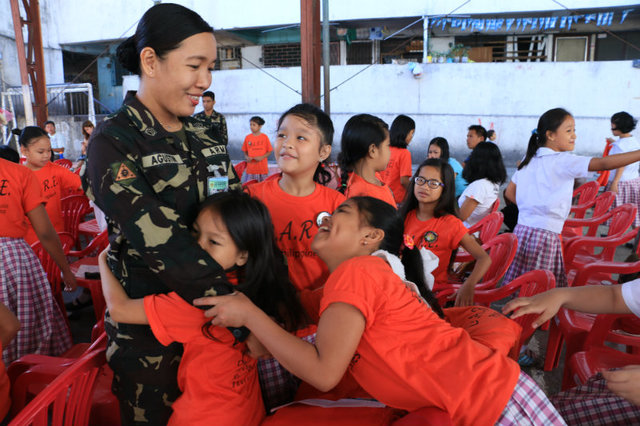More than a thousand students at the Tenement Elementary School graduate from the Drug Abuse Resistance Education (DARE) Program of the Philippine Army in partnership with DARE Philippines Association

CULMINATION. The Tenement Elementary school caps of the two-month long DARE program with a culminating activity with the Philippine Army. Photo by Raisa Serafica/Rappler
Celebratory music blared from speakers inside the school gymnasium. Parents were busy glamming up their children. Everywhere, there were people smiling and cameras clicking.
The atmosphere at the Tenement Elementary School on Friday morning, March 31, clearly reflected the graduation season. Unlike other similar rites elsewhere in the country, one element stood out in the end-of-school picture: army officers in uniform scattered all around the school.
It was, after all, not an ordinary culminating activity.
On Friday, 1,241 students at the Tenement Elementary School graduated from the Drug Abuse Resistance Education (DARE) Program of the Philippine Army in partnership with DARE Philippines Association.
"DARE Philippines Association aims to teach elementary students the necessary skills to resist drugs and other similar substances," Colonel Thomas Sedano said in Filipino.
Clad in their school uniforms and orange shirts that spelled DARE, the students took turns receiving their certificates handed out by Sedano and DARE Philippines Executive Vice President Donna Gasgonia.
Proactive approach
This is the first time the army participated in the DARE program, with Tenement and Signal Village Elementary Schools in Taguig City as their pilot institutions.

Celebratory music blared from speakers inside the school gymnasium. Parents were busy glamming up their children. Everywhere, there were people smiling and cameras clicking.
The atmosphere at the Tenement Elementary School on Friday morning, March 31, clearly reflected the graduation season. Unlike other similar rites elsewhere in the country, one element stood out in the end-of-school picture: army officers in uniform scattered all around the school.
It was, after all, not an ordinary culminating activity.
On Friday, 1,241 students at the Tenement Elementary School graduated from the Drug Abuse Resistance Education (DARE) Program of the Philippine Army in partnership with DARE Philippines Association.
"DARE Philippines Association aims to teach elementary students the necessary skills to resist drugs and other similar substances," Colonel Thomas Sedano said in Filipino.
Clad in their school uniforms and orange shirts that spelled DARE, the students took turns receiving their certificates handed out by Sedano and DARE Philippines Executive Vice President Donna Gasgonia.
Proactive approach
This is the first time the army participated in the DARE program, with Tenement and Signal Village Elementary Schools in Taguig City as their pilot institutions.

SALUTE. Col. Thomas Sedano poses with elementary students of the Tenement Elementary School. Photo by Raisa Serafica/Rappler
“This is historical for us. This is the first time our soldiers taught DARE lessons. In 1993, when the DARE program was introduced in the Philippines by then Vice President Joseph Estrada, only police officers became DARE teachers,” Gasgonia shared in mixed Filipino and English.
The program at the Tenement Elementary School started in January and ended in March 2017. Twice a week, soldiers would spend an hour teaching Grade 5 and 6 students about the ill-effects of drugs and why they should avoid it.
The program also becomes crucial as President Rodrigo Duterte’s war on drugs shows no signs of slowing down. Before the brief suspension of the PNP's anti-drug operations in January, there were a total of 2,555 suspected drug personalities killed in police operations as of January 31, 2017. Since March 6, when the PNP officially relaunched its participation in Oplan Double Barrel Alpha Reloaded, 69 suspected drug personalities were killed in police operations as of March 31.
It is as if the goal of the DARE program is to prevent children from becoming a number in the statistics when they grow up.
“Kung ayaw 'nyong matokhang, umiwas kayo sa droga (If you do not want to get killed in Oplan Tokhang, avoid drugs),” Principal Geronima Garcia bluntly told the DARE graduates.
Considered a proactive approach in the war against drugs, the DARE program teaches effective peer resistance against drugs. It also envisions to rear self-reliant and healthy young individuals who would find no reason to depend on drugs and other similar harmful substances.
'No' to drugs
When asked if they knew anyone suspected of using drugs, the children from the audience answered with a resounding "yes."
This is why Kate Magallanes, a Grade 6 student at the Tenement Elementary School, is more than thankful for undergoing the DARE program. Despite her young age Magallanes is well-versed in the topic of drugs and Oplan TokHang.

GRADUATE. Grade 6 student Kate Magallanes thanks the Philippines soldiers for teaching them the ill-effects of drugs. Photo by Raisa Serafica/Rappler
The program at the Tenement Elementary School started in January and ended in March 2017. Twice a week, soldiers would spend an hour teaching Grade 5 and 6 students about the ill-effects of drugs and why they should avoid it.
The program also becomes crucial as President Rodrigo Duterte’s war on drugs shows no signs of slowing down. Before the brief suspension of the PNP's anti-drug operations in January, there were a total of 2,555 suspected drug personalities killed in police operations as of January 31, 2017. Since March 6, when the PNP officially relaunched its participation in Oplan Double Barrel Alpha Reloaded, 69 suspected drug personalities were killed in police operations as of March 31.
It is as if the goal of the DARE program is to prevent children from becoming a number in the statistics when they grow up.
“Kung ayaw 'nyong matokhang, umiwas kayo sa droga (If you do not want to get killed in Oplan Tokhang, avoid drugs),” Principal Geronima Garcia bluntly told the DARE graduates.
Considered a proactive approach in the war against drugs, the DARE program teaches effective peer resistance against drugs. It also envisions to rear self-reliant and healthy young individuals who would find no reason to depend on drugs and other similar harmful substances.
'No' to drugs
When asked if they knew anyone suspected of using drugs, the children from the audience answered with a resounding "yes."
This is why Kate Magallanes, a Grade 6 student at the Tenement Elementary School, is more than thankful for undergoing the DARE program. Despite her young age Magallanes is well-versed in the topic of drugs and Oplan TokHang.

GRADUATE. Grade 6 student Kate Magallanes thanks the Philippines soldiers for teaching them the ill-effects of drugs. Photo by Raisa Serafica/Rappler
According to Magallanes, children like her are vulnerable to drugs, cigarettes, and other social problems because they are "on the stage of confusion and easily influenced by peers."
"We are trained to be watchful in our community and understand the essence of Oplan TokHang," Magallanes said.
Citing President Rodrigo Duterte, the Grade 6 student added that she now understood what Duterte meant when he said, "Papatayin ko lahat ng mga taong sisira sa kinabukasan ng mga kabataan (I will kill everyone who destroy the future of our children)."
When he ran for the highest public office in the land, Duterte said in one of his campaign materials that children will be among the first to benefit from his presidency.
Data show that there children are also among those are affected by the drug war. Thousands of orphaned children and widows have been left behind by those killed in the government’s brutal war on drugs. As of February 2017, a total of 31 minors under the age of 18 have also been killed by police and vigilantes in the anti-drug campaign, according to Rowena Legaspi, executive director of the Children's Legal Rights and Development Center, a non-governmental group that has documented the killings.
Protecting children
The students were not the only ones who underwent education and training under the DARE program.
To become a DARE teacher, soldiers had to finish a 10-day training where they learned classroom management, communication skills, adolescent development, drug information, and teaching strategies. They were also given a thorough guide on DARE’s 17 lessons.

SOLDIER TEACHER. Members of the Philippine army moonlight as teachers for almost two months under the DARE program. Photo courtesy of the Armed Forces of the Philippines
"We are trained to be watchful in our community and understand the essence of Oplan TokHang," Magallanes said.
Citing President Rodrigo Duterte, the Grade 6 student added that she now understood what Duterte meant when he said, "Papatayin ko lahat ng mga taong sisira sa kinabukasan ng mga kabataan (I will kill everyone who destroy the future of our children)."
When he ran for the highest public office in the land, Duterte said in one of his campaign materials that children will be among the first to benefit from his presidency.
Data show that there children are also among those are affected by the drug war. Thousands of orphaned children and widows have been left behind by those killed in the government’s brutal war on drugs. As of February 2017, a total of 31 minors under the age of 18 have also been killed by police and vigilantes in the anti-drug campaign, according to Rowena Legaspi, executive director of the Children's Legal Rights and Development Center, a non-governmental group that has documented the killings.
Protecting children
The students were not the only ones who underwent education and training under the DARE program.
To become a DARE teacher, soldiers had to finish a 10-day training where they learned classroom management, communication skills, adolescent development, drug information, and teaching strategies. They were also given a thorough guide on DARE’s 17 lessons.

SOLDIER TEACHER. Members of the Philippine army moonlight as teachers for almost two months under the DARE program. Photo courtesy of the Armed Forces of the Philippines
Private First Class Jovelyn Domingo is one of the 26 soldiers who took a break from their duties as a soldier to teach in the classroom.
According to Domingo, the students were initially afraid of the soldiers when they began teaching them in January.
“Kasi ‘pag sinabing sundalo, ang alam nila giyera. Pero nung nakapag-umpisa na, na-amaze sila na puwede pala magturo ang mga sundalo tungkol sa masamang impluwensya ng droga,” she said.
(They think of war when you mention soldiers. But once we started, they were azamed that soldiers can teach about the bad influence of drugs.)
She said the experience as a teacher in the DARE program also served as an eye-opener and a learning opportunity. The soldier added that she sees the program as part of their mission to serve and protect children.
Not all soldiers who undergo the 10-day training become DARE teachers. Only those who satisfactorily pass the training proceed to the classrooms to teach the curriculum especially made for 5th and 6th grade students.
According to Domingo, the students were initially afraid of the soldiers when they began teaching them in January.
“Kasi ‘pag sinabing sundalo, ang alam nila giyera. Pero nung nakapag-umpisa na, na-amaze sila na puwede pala magturo ang mga sundalo tungkol sa masamang impluwensya ng droga,” she said.
(They think of war when you mention soldiers. But once we started, they were azamed that soldiers can teach about the bad influence of drugs.)
She said the experience as a teacher in the DARE program also served as an eye-opener and a learning opportunity. The soldier added that she sees the program as part of their mission to serve and protect children.
Not all soldiers who undergo the 10-day training become DARE teachers. Only those who satisfactorily pass the training proceed to the classrooms to teach the curriculum especially made for 5th and 6th grade students.
No comments:
Post a Comment
Note: Only a member of this blog may post a comment.